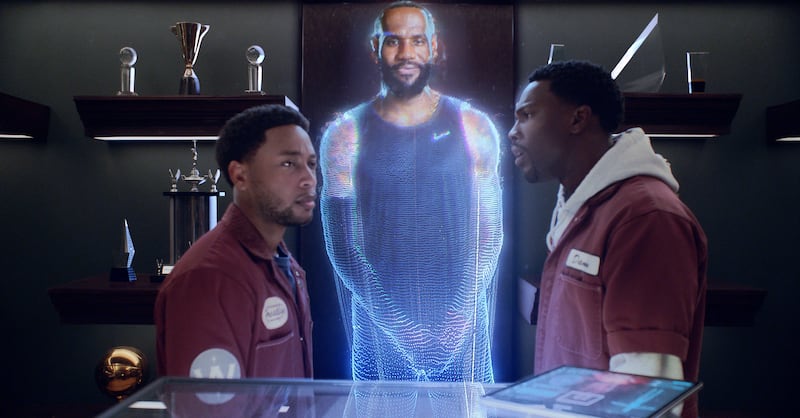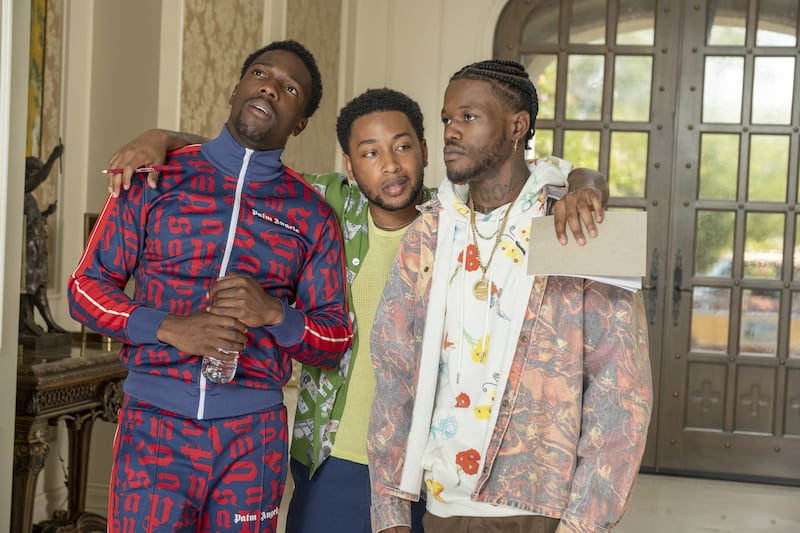You’d be forgiven for not knowing that there’s a House Party remake in theaters nationwide this Friday. The update on Reginald Hudlin’s 1990 classic comedy, produced by New Line Cinema and LeBron James’ SpringHill Company, was initially planned for a streaming-only release on HBO Max but was given a theatrical window during Warner Bros.’ (now Warner Bros. Discovery) sudden restructuring last summer. Despite this bump in distribution, the marketing for House Party has not been as splashy or omnipresent as one would expect for an iconic IP with a huge target audience. Not to mention, January is an odd time to release an R-rated party film, even on Martin Luther King Jr. Day weekend.
However, I’m here to inform you that House Party (2023) does, in fact, exist. It’s also a charmingly outrageous, theater-worthy experience, even if it can’t totally recreate the magic of the original.
Directed by Calmatic—known primarily for his work helming music videos, including Lil Nas X’s “Old Town Road” and Vince Staples’ “Fun!”—House Party is more like a skeleton of the original film rather than a direct copy-and-paste. Notably, Hudlin’s characters, played by rap duo Kid ’n Play, were high schoolers dealing with high school-level shenanigans. The cops were a foreboding presence throughout the film, but the most crucial stakes were parental discipline and female rejection. And while that’s still enough to carry a film in 2023, it’s a safer bet these days to center a movie about debauchery around twentysomethings (unless you’re Sam Levinson, probably).
This new iteration follows two young adults, best friends Damon (Tosin Cole) and Kevin (Jacob Latimore), who are still shacking up with their families and trying to make a decent living as cleaners in Los Angeles. Kevin is more driven, pursuing a career in music production while promoting parties on the side. He’s also a single father at risk of losing custody of his young daughter if he can’t send her to a fancy school. Damon (“pronounced the French way”) is a part-time club promoter as well, though his aspirations boil down to meeting women and making money to buy chains and cars that attract more women. All it takes is an event gone wrong for these two to realize their friendship is at a crossroads.
Early on in the film, they’re assigned an obscenely large mansion to clean that they soon discover belongs to NBA champion LeBron James. During the same shift, they learn they’re about to be fired after their superior colleague Venus (Karen Obilom) tells Kevin that the two have been caught on security cameras slacking off.

To reap as much cash as they can before getting booted from their jobs, Damon devises a plan: They’ll throw a huge bash in James’ home while he’s away on a retreat and charge guests thousands of dollars for admission. Kevin is characteristically reasonable, initially blowing off the idea. Yet his current financial situation forces him to accept Damon’s pitch, despite it sounding totally unfeasible in the age of social media—even with the no-phones rule. (Not to mention that the profit from the party doesn’t feel worth the criminal charges and lawsuits that would almost certainly follow.)
By the time we get to the titular event, House Party is enough of a knowingly outrageous film that viewers could care less about whether it all makes sense. Damon invites a handful of celebrities via sketchy-looking emails and disguised phone calls, most of whom eagerly show up and stick around despite a few things appearing obviously off. One of James’ white neighbors is oddly—but perhaps refreshingly—unsuspicious of everything that goes down. There’s a wild koala; Kid Cudi playing an aggressively spaced-out parody of himself; and an Illuminati subplot that takes a grisly turn.
The film thrives when it leans into outrageousness and surrealism. Screenwriters Stephen Glover and Jamal Olori, known for their work on FX’s Atlanta, are certainly skilled in this particular strain of comedy and implement the same level of absurdity combined with sharp, cultural references in this script. The film’s supporting players, including a hilariously incompetent DJ (Wild ‘N Out’s DC Young Fly) and a rival club promoter (Melvin Greggs), are reminiscent of the hyper-specific side characters that would often steal the show on Atlanta.
On the flip side, some of the film’s emotional stakes are a bit less compelling. In particular, Kevin and Venus have an ongoing flirtation that isn’t spicy enough to maintain our investment. Given how chaste House Party is, it seems like the writers are trying to avoid painting the female characters in a misogynistic light—though none of them are made to be particularly compelling or funny in return. It’s also confounding why Venus, a successful career woman on the verge of a promotion, is willing to put herself in such precarious situations for Kevin.

Where romance lacks, House Party’s central brotherly bond feels more authentic and easy to root for. Beneath their stupidity, Kevin and Damon are decent, well-meaning people who genuinely want the best for each other. And Black men aren’t often afforded the opportunity to display these sort of intense relationships on screen.
Of course, Latimore and Cosin’s performances are crucial to making this entire movie work. Latimore, who’s acted in studio films such as The Maze Runner and Black Nativity, carries all the stress and disappointment of being an aspiring musician with two mouths to feed on his face in every scene. Oppositely, Cosin’s portrayal of Damon is so vivacious and borderline hammy that, at times, it alludes to something darker beneath the surface.
Admittedly, you can sense the effort in almost every gag or emotional sequence in this remake, whereas the writing and performances of the original House Party felt much more relaxed—maybe because a certain pressure was removed—and the humor came more easily. Regardless, the new House Party will make you laugh out loud and audibly gasp, primarily thanks to a series of brilliantly timed cameos and film references that make the last half of it particularly engaging.
While it’s unclear how enthusiastic Warner Bros. Discovery may be about the film—or how big of a financial success it will be—they made a smart decision in forcing the public to see it first with a crowd.






